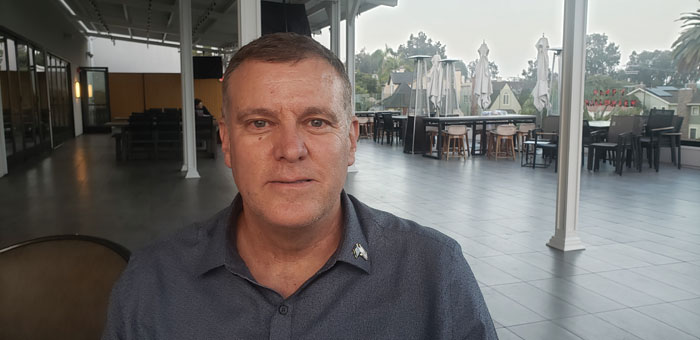
Alon Wald was 10 months old in June 1967 when the Six-Day War started — and ended. It permanently configured his life journey. Hours after multiple Arab armies invaded Jerusalem, Rami Wald, 32, the father he would never know, responded to an emergency call for military help. Shortly afterward, pierced by three enemy bullets, Rami was killed.
“I was actually born into a story,” the now 55-year-old Alon told the Journal during a visit to Los Angeles to address the Jewish National Fund-USA Women for Israel. “The story became the central mission of my life. I did not have a father. He fell while liberating Jerusalem. He was one of the patriots who paved the way into Ammunition Hill, which eventually became the pivotal battle that led our nation to reunite Jerusalem.”
In advance of Veterans Day, JNF-USA Women for Israel hosted a reception commemorating the reunification of Jerusalem and the 55th anniversary of the Six-Day War, its first in-person event in 18 months. Ammunition Hill honors Jewish men and women who have served or currently serve in their country’s militaries around the globe (including the U.S.) through an initiative called the Wall of Honor. Fifteen years ago, JNF recruited Alon to join the Ammunition Hill Heritage Center and Museum it sponsors. It’s Jerusalem’s No. 1 memorial, attracting 500,000 visitors annually.
“He was one of the patriots who paved the way into Ammunition Hill, which eventually became the pivotal battle that led our nation to reunite Jerusalem.”
— Alon Wald
Alon has led an accomplished life. As a major and a commanding officer of an elite IDF paratroopers unit, he established the Maglan unit, a special forces group that operates deep in enemy territory. He was recruited by Israel’s Secret Service, oversaw the security personnel of Israel’s embassies in Cairo and Vienna and was an air marshal for El Al Airlines.
“I felt that my father was with me all the time, pushing and supporting me,” Alon said.
Alon recalled that when he was five years old and starting school, he ran in the trenches “of this amazing battlefield, without realizing I am part of an epic story, Ammunition Hill.”
He continued, “I was angry with my father, because I was told volunteers had to go to war. My father was a reservist. He had been told before the war he had done enough. I wanted answers since I was the only kid in class who had no father. I was curious.”
Alon showed his JNF audience pictures of two of his three daughters atop Mt. Kilimanjaro, which his father once conquered. “I did not mourn my father, but I wanted to know him,” he said. “I wanted to know my part in this journey.”
After the war ended and Jerusalem was reunited, Rami’s fellow soldiers stepped in to look after Alon. “They literally adopted all the orphans of Ammunition Hill and the campaign over Jerusalem,” said Alon. “They became my fathers, my uncles, my older brothers. But they did not ask for titles.”
“I did not mourn my father, but I wanted to know him. I wanted to know my part in this journey.”
— Alon Wald
While his widowed Russian immigrant mother Givat, now 81 years old, lovingly guarded young Alon, “I wanted to know my father through his comrades-in-arms,” he said. “These guys escorted me all over my life. At Ammunition Hill, the cemetery, at elementary school when you needed to bring your father to talk about his amazing career. I had 10 options to bring every year. Bar mitzvah, getting married, going into the army, [when] my wife gave birth to our first daughter — somebody always was there — filling the gap my father left. I can tell you today proudly that I know my father – much better than kids who have a father they take for granted.”
With an historian’s eye, Alon said, “the story of my life is the story of Ammunition Hill, a place that started in a bloody battle, a place that was literally bleeding for the first four years after the war. For 40 years, [Ammunition Hill leaders] spoke of death and sacrifice in the battlefield. We changed everything when we came in.”
Wartime was only 1% of the soldiers’ lives, Wald said, and “we wanted to share the other 99% of our fathers’ lives because people need to be inspired at Ammunition Hill.”























 More news and opinions than at a Shabbat dinner, right in your inbox.
More news and opinions than at a Shabbat dinner, right in your inbox.